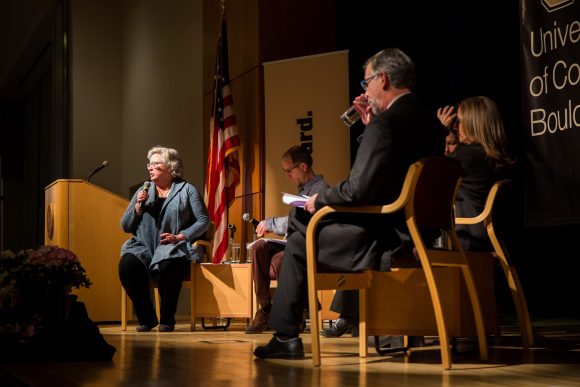
The panel speaks during the 2018 Spring Town Hall at The University of Colorado Boulder. March. 15, 2018. (CU Independent/Will McKay)
Chancellor Philip DiStefano joined a panel of administrators to introduce an initiative designed to help CU evolve in a changing society at the Spring Town Hall on Thursday.
The initiative, named “Academic Futures: Rethinking the university – the futures of learning and discovery” is comprised of suggestions for how the university can better itself in various categories.
Through a series of documents called “the white papers,” community members expressed their ideas for how the university should improve. According to DiStefano, the Academic Futures’ committee members went through over 150 white papers and held over 100 meetings to discuss the initiative.
The Academic Futures initiative started in Sept. 2017 and white papers were due in Dec. 2017. The themes of the white papers fall into 20 categories, including academic advising, campus-wide core curriculum, and inclusive excellence.
“[It’s an] invitation to everyone on this campus to bring their most creative ideas of what the university could be,” DiStefano said.
The town hall panel included three members of the Academic Futures’ committee: Sarah Krakoff, Alexis Templeton and Orrie Gartner. Each panelist offered what they believe is most necessary to make this initiative a reality.
Law professor Sarah Krakoff is in charge of the subcommittee with the temporary name “keeping the public in public education.” Krakoff said that the initiative needs support from the state, “otherwise whatever [they] come up with is just another piece of paper.”
Alexis Templeton, associate professor in geological sciences, said community involvement in Academic Futures is essential for its success.
“It is a people-driven process,” Templeton said.
Orrie Gartner is the director of IT operations and Cloud infrastructure.
“Academic Futures can exist because the university is in a good place,” Gartner said, emphasizing the importance of the university’s strength in the initiative.
Junior CU student government candidate Dylan Robinson-Ruet was at the town hall meeting. He said that he does not think students are as involved in this initiative as they should be.
“It is the students that spend most of their time on this campus, and so it is the students that know what a lot of the problems are,” Robinson-Ruet said.
Future town hall meetings which focus on the initiative will take place weekly throughout the rest of the semester.
“When we look at the world around us, no one has to tell us how quickly it is changing, socially, technologically, environmentally, geopolitically and economically,” DiStefano said. “CU Boulder is part of this moment of transformation.”
Contact CU Independent News Writer Shaylynne Voth at shaylynne.voth@colorado.edu.
